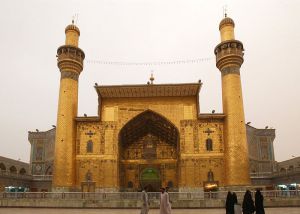Shia in Iraq come out in Vast Numbers to Listen to Cleric Sayyid Muqtada al-Sadr in Baghdad
Murad Makhmudov, Takeshi Hasegawa and Lee Jay Walker
Modern Tokyo Times
The Shia holy cleric Sayyid Muqtada al-Sadr spoke powerfully to vast numbers of Shia Muslims in Baghdad. Unlike many senior politicians, al-Sadr did not hide in Baghdad from the fear of ISIS (Islamic State – IS) or other Sunni Takfiri Islamist terrorist attacks. Instead, he reminded the political elites that vast numbers of Iraqi nationals are disillusioned with the ambiguity of the state apparatus. This notably applies to corruption, poverty, tackling ISIS, national sovereignty, terrorism, lack of opportunities, the infrastructure and political accountability.
Shia Muslims listened tentatively to al-Sadr because like many Iraqis in general, irrespective of religious affiliation, disillusionment is extremely high. Al-Sadr knows full well that external forces continue to meddle within the military and political infrastructure. For example, Turkey thinks little about bypassing authorities in Baghdad when dealing with energy issues with the Kurds in northern Iraq – this especially applies when tensions between Ankara and Baghdad exist. Therefore, with external political interference being high in Iraq many individuals feel exhausted by the nightmare of modern day events in this nation.
After all, ISIS is committing mass sectarian atrocities against the Shia and is enslaving and persecuting religious minorities including Christians, Shabaks and Yazidis. At the same time, Shia mosques continue to be targeted and terrorism is only a moment away because of the brutality of Sunni Takfiri forces. Indeed, even Sunni forces opposed to ISIS feel abandoned by central forces. Given this reality, discontent exists in all religious groups towards the current government of Iraq and the same applies to ethnic groups including the Kurds.
Therefore, al-Sadr spoke openly to the alienated Shia underclass in Baghdad and other people from the same faith from various walks of life. He attacked the reality of enormous political corruption and how people feel abandoned and alienated. However, al-Sadr is backing the reform minded Prime Minister Haider al-Abadi who is promising to alter the current inept status quo of political corruption and social alienation. In saying this, it could well be that al-Abadi is the final straw for al-Sadr because if his promise of genuine reforms fail, then maybe it is time for another option. Until then, al-Sadr is open to providing much needed support to al-Abadi given the fractious nature of politics in Iraq.
Al-Sadr said to the enormous crowd “I am among you to say to you, frankly and bravely, that the government has left its people struggling against death, fear, hunger, unemployment, occupation, a struggling economy, a security crisis, bad services and a big political crisis.”
The New York Times reports “Mr. Abadi’s proposal to tackle corruption and install technocrats in the country’s ministries has stalled over the opposition of powerful militia leaders and some pro-Iran politicians. For his part, Mr. Sadr has offered to have his ministers resign in protest to lend Mr. Abadi’s agenda some steam. Despite that, and the support of the most senior Shiite cleric, Grand Ayatollah Ali al-Sistani, it remains unclear whether Mr. Abadi’s agenda will be able to win the help of any other political blocs.”
If the current government of al-Abadi fails to deliver then al-Sadr will up the ante against central forces. After all, the sight of ISIS in Mosul is galling to al-Sadr and the same applies to the role of Ankara, Tehran and Washington into the internal affairs of Iraq. In the past al-Sadr was viewed negatively in many circles but just like the evolution of Hezbollah in Lebanon, then times are changing because now al-Sadr is focused on the bigger picture and the preservation of Iraq. Therefore, with so many people being disillusioned with the current reality of modern day Iraq then al-Abadi needs to respond strongly to the many issues the nation state faces. If not, then al-Sadr is making it known that alternative options exist.
http://www.nytimes.com/2016/02/27/world/middleeast/moktada-al-sadr-iraq.html?src=me&_r=0
Modern Tokyo News is part of the Modern Tokyo Times group
DONATIONS to SUPPORT MODERN TOKYO TIMES – please pay PayPal and DONATE to sawakoart@gmail.com
http://moderntokyotimes.com Modern Tokyo Times – International News and Japan News
http://sawandjay.com Modern Tokyo Times – Fashion
https://moderntokyonews.com Modern Tokyo News – Tokyo News and International News
http://global-security-news.com Global Security News – Geopolitics and Terrorism
PLEASE JOIN ON TWITTER
https://twitter.com/MTT_News Modern Tokyo Times
PLEASE JOIN ON FACEBOOK

